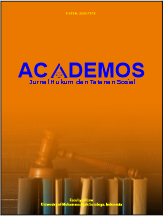Reflections on Supreme Court Decision Number 23 P/HUM/2024: The Escalation of Political Judicialization and Judicial Politicization in Norm Testing
DOI:
https://doi.org/10.30651/aca.v3i1.22984Keywords:
Mahkamah Agung, Putusan, Yudisialisasi, PolitikAbstract
The lofty goal of realizing an independent judiciary to uphold law and justice is now facing a steep road because in the process, the judiciary is always vis a vis at the crossroads between law and politics. Currently, instead of bringing the issue of interference, the judiciary has become the party that intervenes in the rule-making power, and this has almost reached a culmination point. The latest crucial event is Supreme Court Decision No. 23/P/HUM/2024. The decision changes the meaning of the prerequisite norm of the age limit for Regional Head candidates, which is calculated from the determination of the candidate pair, to be calculated from the inauguration. Starting from the description above, this research aims to explore the meaning of the Supreme Court's activities in the concept of political judicialization and judicial politicization. The research method used is normative (legal) research, with statutory, case, historical, and conceptual approaches. The results of this study are, first, Supreme Court Decision No. 23 P/HUM/2024 shows weaknesses because the arguments given are not sufficient, and the Supreme Court also exceeds its authority by intervening in the legal policy authority of the KPU, this can be interpreted as political judicialization and judicial politicization. Second, the Problems of Supreme Court Decision No. 23 P/HUM/2024 are enough to reflect that there are still legal gaps that must be addressed. So that in the future, in the context of legal reform, it is necessary to integrate one-stop testing of laws and regulations in the Constitutional Court.
References
Achmad, A. (2009). Menguak Teori Hukum (Legal Theory) dan Teori Peradilan (Judicial Prudence). Prenada Media Group.
Arifin, R. (2020). Legal reform discourse in Indonesia and global context: How does the law respond to crime. Journal of Law and Legal Reform, 1(2), 193–196.
Arsil, F. (2009). Peran Mahkamah Konstitusi Dalam Penyelesaian Sengketa Pemilu 2009. Jurnal Legislasi Indonesia, 6.
Asshiddiqie, J. (2021). Konstitusi dan konstitusionalisme Indonesia. Sinar Grafika.
Azhary, H. M. T. (2015). Beberapa Aspek Hukum Tata Negara, Hukum Pidana dan Hukum Islam. Prenada Media.
Borman, M. S. (2017). Independensi Kekuasaan Kehakiman dari Pengaruh Kekuasaan di Indonesia. Lex Journal: Kajian Hukum & Keadilan, 1(1).
Effendi, O. (2020). Pembatasan Kekuasaan Berdasarkan Paham Konstitusionalisme di Negara Demokrasi. Politica: Jurnal Hukum Tata Negara Dan Politik Islam, 7(2), 111–133.
Fallon Jr, R. H. (2013). The Dynamic Constitution: An Introduction To American Constitutional Law And Practice. Cambridge University Press.
Firmansyah, A.T., Cengkeng, A. & Sirajuddin. 2021. Rekonstruksi Pengujian Kembali terhadap Putusan Pengujian Undang-Undang di Mahkamah Konstitusi Untuk Meminimalisir Dampak Sifat Putusan yang Final dan Mengikat. Conference on Innovation and Application of Science and Technology (CIASTECH). 15 Desember 2021, Malang, Indonesia. pp. 133–142.
Ferejohn, J. (2002). Judicializing politics, politicizing law. Law and Contemporary Problems, 65(3), 41–68.
Hirschl, R. (2008). The Judicialization of Politics. Oxford University.
Huda, N. (2007). Lembaga negara dalam masa transisi demokrasi. UII Press.
Hutajulu, M. J. (2015). Filsafat hukum dalam putusan pengadilan/hakim. Refleksi Hukum: Jurnal Ilmu Hukum, 9(1), 91–100.
Imam, S. (2019). Asas Contrarius Actus sebagai Kontrol Pemerintah terhadap Kebebasan Berserikat dan Berkumpul di Indonesia. Mimbar Keadilan, 12(2), 181–195.
Kusumohamidjojo, B. (2016). Teori Hukum Dilema Antara Hukum Dan Kekuasaan. Penerbit Yrama Widya.
Lailam, T. (2018). Penataan kelembagaan pengujian norma hukum di Indonesia. Jurnal Konstitusi, 15(1), 206–230.
Manan, B., & Harijanti, S. D. (2017). Artikel Kehormatan: Peraturan Pemerintah Pengganti Undang-Undang dalam Perspektif Ajaran Konstitusi dan Prinsip Negara Hukum. Padjadjaran Jurnal Ilmu Hukum (Journal of Law), 4(2), 222–243.
Marzuki, P. M. (2017). Penelitian Hukum: Edisi Revisi. Prenada Media.
Perdana, A., & Imam, M. (2023). Judisialisasi Politik dalam Putusan MK terkait Batas Usia Cawapres dalam Pilpres 2024. Jurnal Bawaslu DKI, 8(3), 69–92.
Prodjodikoro, W. (1974). Bunga rampai hukum: karangan tersebar. Ichtíar Baru.
Ramadhan, F., Efendi, S., & Rafiqi, I. D. (2022). Penentuan Jenis Produk Hukum dalam Pelaksanaan Putusan Mahkamah Agung tentang Hak Uji Materil (Kajian terhadap Tindak Lanjut Putusan Mahkamah Agung 28 P/Hum/2018). Jurnal Rechts Vinding: Media Pembinaan Hukum Nasional, 11(1), 55–76.
Saptohutomo, A. P. (2024). Putusan MA Diduga Bagian Manuver Politik demi Bantu Kaesang pada Pilkada. Kompas.
Simanjuntak, E. (2018). Kewenangan Hak Uji Materil pada Mahkamah Agung RI. Jurnal Hukum dan Peradilan, 2(3), 337–356.
Sunarto, S. (2016). Prinsip Checks and Balances Dalam Sistem Ketatanegaraan Indonesia. Masalah-Masalah Hukum, 45(2), 157–163.
Syahuri, T. (2014). Pengkajian Konstitusi tentang Problematika Pengujian Peraturan Perundang-Undangan. Jakarta: Badan Pembinaan Hukum Nasional Kementerian Hukum Dan HAM RI.
Tushnet, M. (2009). Weak Courts, Strong Rights: Judicial Review And Social Welfare Rights In Comparative Constitutional Law. Princeton University Press.
Downloads
Published
Issue
Section
License
Copyright (c) 2024 syarif Hidayatullah Azhumatkhan, Adithya Tri Firmansyah, Muhammad Ramadhana Alfaris

This work is licensed under a Creative Commons Attribution 4.0 International License.






